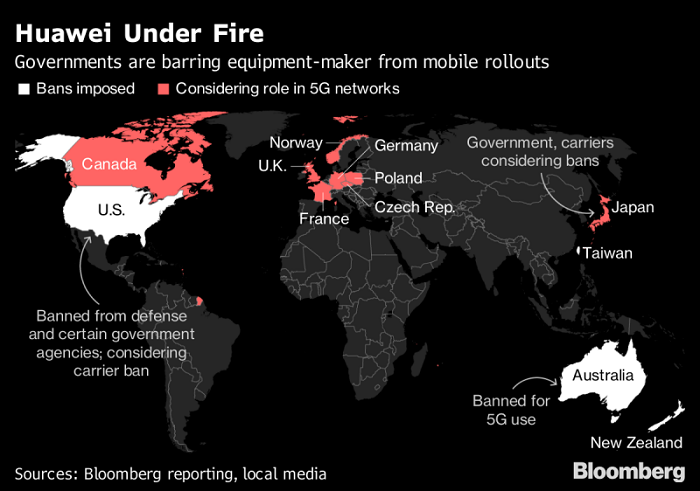China’s President Xi in his opening speech at the Belt and Road Forum in Beijing in May 2017 had called for a “digital silk road” which intended to provide a space for Chinese tech companies to expand their activities in countries who are part of the Belt and Road. He called on China and the BRI parties to “intensify cooperation in frontier areas such as digital economy, artificial intelligence, nanotechnology and quantum computing, and advance the development of big data, cloud computing and smart cities.”1 This effort might have hit a roadblock with the U.S Department of Justice filing a barrage of cases against Huawei, which includes bank fraud, technology theft and obstruction of justice. 2
Huawei’s Chief Financial Officer (CFO) Meng Wanzhou’s detention by Canadian officials cooperating with US law enforcement officials has opened the floodgates of troubles for China’s technology companies. These companies along with their American counterparts are facing losses, but the Chinese companies face bigger trouble as these depend heavily on components supplied by American companies.3 ZTE’s episode with the U.S Department of Commerce served as a warning to China’s political leadership with Xi emphasising in his speech that it is crucial for China to develop key and core technologies. In the same meeting of the Central Committee for Financial and Economic Affairs, various stakeholders of the Chinese economy especially dealing with technology concluded that much work is needed in the sector in order to match up with advanced international levels.4
Europe too has joined the U.S in condemning questionable practices by China’s technology companies, especially Huawei. Punitive actions are being considered for Huawei’s role in the telecom sector, with the European Union digital chief suggesting companies to re-evaluate their partnerships with Huawei because of the new amendment in the Chinese intelligence law5 which suggests private organisations and citizens must assist the intelligence agencies. This is stated in Article 7 of the National Intelligence Law of the People’s Republic of China.6 Polish law enforcement officials in mid-January arrested a Huawei executive, a sales director, on charges of spying along with a Polish citizen. If convicted both faces ten years in prison. Huawei has disassociated itself from the arrest by firing the executive and claiming that the company works according to the host country’s rules and regulations.7
Poland’s internal affairs ministry has now called for a joint EU-NATO statement on the future of Huawei in North America and Europe. 8 Domestically, Poland has excluded Huawei from working with telecom operators on 5G technology. The Polish President in an interview said that he is willing to cooperate with firms from Europe or the US but not from Asia to provide 5G technology to the largest economy in East Europe.9 French telecom companies like Orange have put an effective ban on using Huawei equipment for core 5G technology, and German Telecom Company Deutsche Telekom is also seriously considering its partnership with them.10 Chinese companies now are under serious scrutiny wherein countries, especially in Europe, are threatening to lock out Huawei from any future business in their countries, which effectively is a roadblock to the ‘Digital Silk Road’.
China has spent around 79 billion USD on the Digital Silk Road programme. While Europe is still considering its next plan of action regarding Huawei, US has banned both ZTE and Huawei, and Africa and Asia (barring Japan) have open heartedly accepted Chinese technology. Zambia is relying heavily on Chinese equipment for its telecom sector and its “safe city” programme, effectively creating a surveillance state. Huawei also handles Zambia’s national data centre. Similar situations can be witnessed in African states like Zimbabwe and Mauritius. Zambian civil society has been actively pursuing to push for cyber laws based on standards laid down by the European Union.11 In the 19th National Congress of PRC, in 2017 President Xi delivered a report wherein he mentions that the Chinese political business model is doing well, setting an example for other developing countries, with China willing to assist them using “Chinese wisdom” to gain the same growth rates as China has achieved. The African civil society and the opposition parties in parliaments see this as a call for emulation of the Chinese way of governance.12
Perception about Chinese technology companies over the years has changed from making cheap products to top rated products at affordable prices. Internet was seen as the medium to share views and information, especially through social media platforms but most of them have been banned in China. China’s privately owned enterprises, especially technology companies have come out with their products and platforms which have conveniently replaced the western platforms for the Chinese populace. China has now effectively created its version of the internet where information is disseminated according to what the party wants along with its surveillance. In order to create sophisticated platforms and build telecom components since the global financial crisis of 2008 through rampant mergers and acquisitions, China, has been buying up companies working on future tech in Europe and North America.

It is yet to be seen as to whether Huawei will be spared as ZTE was by the US. However, the US Government might put countries, who are looking forward to enhancing their telecom infrastructure, in an awkward situation if Chinese companies with suspected links with the Communist Party are put under the Designated Nationals List, which could mean that businesses with Chinese entities would lead to unilateral sanctions being placed by the US. Meanwhile, the Overseas Private Investment Corp. is an initiative put on the table by the US National Security Advisor possibly to counter the large Chinese infrastructure projects in Africa, and it intends to put 60 billion USD as investments in Africa. 13

(Source: https://finance.yahoo.com/news/telus-backs-apos-viable-reliable-162912960.html)
If Huawei is put in the list, the company would end up losing a significant chunk of their revenue, as half of its revenues come from outside China. Huawei is what one can call the Chinese answer to western companies, but the loss of business abroad would mean Chinese ambitions of a technological advantage suffering a significant setback, and Huawei’s growth spree might come to grinding halt. With Committee on Foreign Investment in the United States (CIFUS) and European Union deliberating upon an investment screening process, Asia and Africa are the only two frontiers where the Chinese might have a chance to do well but the new US initiatives in Africa might lead to Chinese strategic thinkers to go back to the drawing board to counter the initiative, which now threatens the Chinese foreign policy initiative to be at the center stage of world affairs.
References:
- Jinping, Xi. "Work Together to Build the Silk Road Economic Belt and The 21st Century Maritime Silk Road." Speech, The Belt and Road Forum for International Cooperation, People's Republic of China, Beijing, May 14, 2017.
- Al-Heeti, Abrar. "US Hammers Huawei with 23 Indictments for Alleged Trade Secret Theft, Fraud." CNET. January 29, 2019. Accessed January 2019. https://www.cnet.com/news/us-hammers-huawei-with-indictments-for-stolen-trade-secrets-fraud/.
- Brunstien, Joshua. "Trump’s Trade War Threatens to Divide the World’s Smartphone Makers." Bloomberg.com. January 10, 2019. Accessed February 07, 2019. https://www.bloomberg.com/news/features/2019-01-10/trump-s-trade-war-threatens-to-divide-the-world-s-smartphone-makers.
- "Xi Stresses Improving Innovation Capabilities for Key, Core Technologies." Xinhua. July 14, 2018. Accessed January 2019. http://www.xinhuanet.com/english/2018-07/14/c_137322614.htm.
- Tweed, David, and Yuan Gao. "U.S. Message to World With Huawei Case: Don’t Trust China on 5G." Bloomberg.com. January 29, 2019. Accessed January 2019. https://www.bloomberg.com/news/articles/2019-01-29/u-s-message-to-world-with-huawei-case-don-t-trust-china-on-5g?cmpid=socialflow-facebook-business&utm_source=facebook&utm_content=business&utm_campaign=socialflow-organic&utm_medium=social&fbclid=IwAR0UvJwjYIZ9If3YL2RQFcxujZ1P8w7cwoWZbWqz3aHNmsXQa_hBEAcRG5E
- "National Intelligence Law of the People's Republic of China (2018 Amendment) [Effective]." LawinfoChina. April 27, 2018. Accessed January 2019. http://en.pkulaw.cn/display.aspx?cgid=313975&lib=law.
- Riley, Charles, and Antonia Mortensen. "Huawei Fires Employee Arrested in Poland on Spying Charges." CNN. January 12, 2019. Accessed January 2019. https://edition.cnn.com/2019/01/11/tech/poland-huawei-exec-arrest/index.html.
- Reuters. "Poland Calls for 'joint' EU-Nato Stance on Huawei after Spying Arrest." The Guardian. January 13, 2019. Accessed January 2019. https://www.theguardian.com/world/2019/jan/12/huawei-sacks-chinese-worker-accused-of-spying-in-poland-wang-weijing.
- Plucinska, Joanna. "Poland Set to Exclude China's Huawei from 5G Plans." Reuters. January 24, 2019. Accessed January 2019. https://www.reuters.com/article/us-poland-security/poland-set-to-exclude-chinas-huawei-from-5g-plans-idUSKCN1PI2B7.
- Riley, Charles. "Doors Are Slamming Shut for Huawei around the World." CNN. December 14, 2018. Accessed January 2019. https://edition.cnn.com/2018/12/14/business/huawei-deutsche-telekom-orange/index.html.
- Prasso, Sheridan. "China's Digital Silk Road Is Looking More Like an Iron Curtain." BloombergQuint. January 15, 2019. Accessed January 2019. https://www.bloombergquint.com/china/china-s-digital-silk-road-is-looking-more-like-an-iron-curtain.
- Jinping, Xi. Secure a Decisive Victory in Building a Moderately Prosperous Society in All Respects and Strive for the Great Success of Socialism with Chinese Characteristics for a New Era. Delivered at the 19th National Congress of the Communist Party of China October 18, 2017. October 18, 2017. http://www.xinhuanet.com/english/download/Xi_Jinping's_report_at_19th_CPC_National_Congress.pdf.
- Hurtado, Patricia, and Edvard Pettersson. "Huawei's Worst-Case Survival Guide for U.S. Criminal Crackdown." Bloomberg.com. February 1, 2019. Accessed February 2019. https://www.bloomberg.com/news/articles/2019-02-01/huawei-s-worst-case-survival-guide-for-u-s-criminal-crackdown?utm_source=facebook&utm_content=business&cmpid=socialflow-facebook-business&utm_campaign=socialflow-organic&utm_medium=social&fbclid=IwAR25oWYyAlC9olHpyctwTA_gUtiLWIXqf7TBzoUleZrgMVzz3vPI9Ddoll8.
Image Source: https://www.itwire.com/fuzzy-logic/84157-is-huawei-5g-ban-in-australia-part-of-the-current-battle-for-pm.html










Post new comment